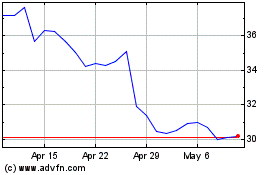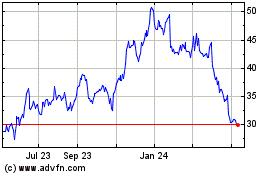By Vanessa Fuhrmans and Rachel Feintzeig
Chief executives used to be able to operate with little scrutiny
beyond their quarterly results. That's no longer the case.
Intel Corp. CEO Brian Krzanich resigned Wednesday after the
company said it found he had a past, consensual relationship with
an Intel employee -- what it called a violation of the tech giant's
nonfraternization policy, which applies to all managers.
Decades ago, board members were more likely to look the other
way on office romances and other matters considered personal,
according to executive recruiters and corporate governance experts,
but the role of CEO is more high profile than ever before, limiting
the room for transgressions. Today, big institutional investors
want board members vetting strategy, ensuring succession plans are
in place and thinking about reputational risk, they said.
The rise of the #MeToo movement has companies hewing closely to
their policies on sexual harassment, as well as on consensual
relationships, especially for business leaders, said Davia Temin,
the chief executive of Temin & Co., a Manhattan-based
reputation and crisis-management firm.
"There's a new level of rigor that says if something is on the
books, it needs to be upheld and not ignored," she said, adding
that boards of directors are increasingly concerned about anything
that might affect a company's reputation.
Corporate missteps can go viral fast, thanks to cellphone
cameras, social media and apps and websites like Glassdoor and
Blind -- popular with tech workers -- where employees can
anonymously share feedback.
"It's much less easy to have secrets," Ms. Temin said.
"Organizations are more porous."
Dating at the office can be complicated, and relationship rules
at U.S. companies vary. Some firms ban senior managers from dating
anybody further down the chain of hierarchy within the company,
while others ask for co-workers to disclose their relationships.
Many companies have no employee dating policy at all.
But for many CEOs of major companies, their employment contracts
explicitly prohibit romantic relationships with employees, or give
boards wide latitude to fire a chief executive for anything
considered unethical behavior, said Jason Hanold, head of
executive-search firm Hanold Associates.
Though such language has been a feature of C-suite executive
contracts for decades, boards have become more sensitive to any
hint of improper behavior -- past or present -- especially in the
#MeToo era, he said.
"Today it's a well-known expectation that comes with the CEO
role," Mr. Hanold said. "To have a relationship with anyone in your
organization, you're doing so knowing all of the risks."
Some boards Mr. Hanold has worked with have also intensified the
vetting process for CEO contenders to scour for any past
improprieties, often calling people in their own networks to do
some of the vetting themselves, he said.
During a recent search that Mr. Hanold conducted for a top
executive as a major education company, he said, the CEO personally
called a number of the candidate's character references. "They want
to make sure nothing is missed," he said.
Shareholder pressure has prompted directors to be more hands-on
in all sorts of issues, including rule-breaking, said David
Larcker, a corporate governance professor at Stanford Graduate
School of Business.
"They're pushing the boards to become more engaged, more active,
and I think that's part of what's going on here," he said.
Hewlett-Packard Co.'s standards of business conduct in 2010
suggested that employees pose a simple question to themselves
before deciding whether an action was appropriate: "Before I make a
decision, I consider how it would look in a news story," the
document stated.
Mark Hurd, then CEO of HP, was ousted in 2010 after he was
discovered to be in a relationship with a contract worker. At the
time, an HP spokesman said Mr. Hurd wasn't violating any company
policy regarding sexual harassment but had submitted inaccurate
expense reports that were intended to conceal what the company said
was a "close personal relationship" with the woman.
"As the investigation progressed, I realized there were
instances in which I did not live up to the standards and
principles of trust, respect and integrity that I have espoused at
H-P and which have guided me throughout my career," Mr. Hurd said
at the time. Within weeks of Mr. Hurd's departure, Oracle Corp.'s
Larry Ellison hired him as Oracle's co-president. In 2014, he and
Safra Catz took over as Oracle's co-CEOs when Mr. Ellison stepped
down from the post.
Even when CEOs look for love outside the office, the results can
be messy and embarrassing. Brenda Jarvis filed suit against Sara
Lee Corp. and its then-chief executive C. Steven McMillan in 2004,
alleging that Mr. McMillan flew her to Chicago, offered her a job,
had sex with her and later rescinded the employment offer after she
turned down a second encounter.
Sara Lee said Mr. McMillan, who was unmarried, invited Ms.
Jarvis to Chicago for a social weekend, not a job interview. The
company confirmed the pair had sexual intercourse but denied that
Mr. McMillan offered Ms. Jarvis a job. The suit was settled later
that year, and the terms were undisclosed.
Even at companies with CEOs not in the public eye, boards have
become more mindful about how executive behavior plays out among
employees, said Scott Eblin, an author and executive coach to
senior executives at Fortune 500 companies.
"In a case like Intel's, the board is sending a message to the
people at Intel about what's acceptable," he said. "If you expect
people to abide by those policies, they have to show there is
little tolerance for violations, even at the highest level."
Mr. Eblin said CEOs tend to spend more time with their
colleagues than family and friends, and emotional bonds develop.
"That's the human part of it," he said. "As a CEO, you've got to be
very careful about your personal boundaries."
(END) Dow Jones Newswires
June 21, 2018 15:24 ET (19:24 GMT)
Copyright (c) 2018 Dow Jones & Company, Inc.
Intel (NASDAQ:INTC)
Historical Stock Chart
From Mar 2024 to Apr 2024

Intel (NASDAQ:INTC)
Historical Stock Chart
From Apr 2023 to Apr 2024
